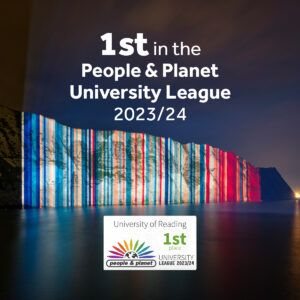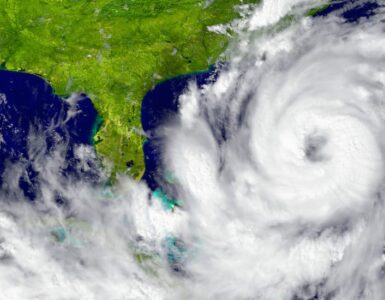2023 was an extremely proud year for the University of Reading, as we continued to lead the way in raising awareness and researching climate change and its impacts. CONNECTED casts a look back at last year’s exciting achievements.
 The number one university
The number one university
The University of Reading has been ranked as the number one university in the UK in the latest People & Planet University League table.
The University has climbed three places to claim the top spot in the 2023/2024 rankings after making progress in criteria including ethical banking, workers’ rights and carbon reduction. The University was also recognised for managing carbon emissions, providing climate education resources and a sustainable food policy.
Vice-Chancellor, Professor Robert Van de Noort said: “As a University we have a long history of leadership in environmental and agricultural science, as well as social and political issues. We’re nearing our centenary as a university and have always aimed not just to educate people and do research to learn about the world, but to do something about it as well.
“We’ve developed a position as one of the leading scientific institutions on weather, climate and agriculture, but our commitment to sustainability can be seen across all our subject areas – from the built environment to business and computer science to law.
“Our commitment to address climate change and be a leader in global environmental sustainability came from the ground up – it was what our students, academics and local community told us that they wanted to do.
“It is wonderful to top the People & Planet league, but we must continue to drive forward. We’ve cut our carbon by 60% but have much to do to achieve our commitment to Net Zero carbon. We are working towards ensuring students of all ages have a good climate education, within the University and within schools and colleges. We have inspired countless conversations about the climate, and need to see those conversations turn to greater action.
“As thrilled as I am that we have been recognised as the greenest university in the country, there is still much we must do to reduce our carbon footprint, to inspire our community to play their part, to inform best practice and work towards the solutions we so urgently need.”
Read more in the University news story.
Winner of THE environmental leadership award
The University of Reading has won the inaugural THE (Times Higher Education) environmental leadership award, in recognition of our world-class research in climate change and its impacts.
 The Outstanding Contribution to Environmental Leadership award was presented to the University at the Times Higher Education Awards 2023 on Thursday 8 December. Reading is the first ever winner of the award and was commended for the institution’s impressive range of measures that have delivered on local, national and international levels.
The Outstanding Contribution to Environmental Leadership award was presented to the University at the Times Higher Education Awards 2023 on Thursday 8 December. Reading is the first ever winner of the award and was commended for the institution’s impressive range of measures that have delivered on local, national and international levels.
THE Awards judges said:
“the University of Reading does not just talk the talk but sets the agenda on one of the biggest issues of our time.” They particularly praised the University’s work as an example of “how climate research and action can be translated into delivery… What stood out was the sheer breadth of Reading’s contributions to environmental leadership…”
Professor Robert Van de Noort said: “This award provides recognition for the University of Reading’s commitment to being a leader in environmental sustainability and climate action.
“I want to congratulate all University staff and students who contributed to this achievement. Whether through our world-class research, our campus operations, or our many external collaborations.
“We are having a real impact through leading by example, but we will not stop there. This award motivates us to push ahead even further and ensure environmental responsibility remains at the very heart of Reading’s identity.”
Read more in the University news story.
£2 million climate education expansion
 Every school, college and university in England will have free access to expert support to become greener and more climate resilient in a national scheme backed by £2 million of Department for Education (DfE) funding.
Every school, college and university in England will have free access to expert support to become greener and more climate resilient in a national scheme backed by £2 million of Department for Education (DfE) funding.
The scheme is an expansion of the Climate Ambassadors programme created by the University of Reading and STEM Learning as one outcome of the National Climate Education Action Plan. Since April 2022, the scheme has seen 236 Climate Ambassadors reach more than 80,000 learners and teachers in 534 schools, colleges and universities.
Professor Andrew Charlton-Perez, the University of Reading climate scientist who led the Climate Ambassador scheme’s creation, said: “We’ve had wonderful success with our climate education activities over the past two years.
“Passing on the expertise of our ambassadors has helped teachers make climate and the environment a feature of their lessons in all subjects, and young people to become advocates for our planet from an early age.
“We have amazing expertise in climate and sustainability right across the country, in our universities, in the private sector and in charities and government. Climate Ambassadors is about unlocking that expertise for the benefit of our education system.
“Nurseries, schools and colleges are the lifeblood of our communities and connect people in ways that few other organisations do. They are places where we can join together in the fight against climate change and biodiversity loss. As we grow the scheme, the number of connections we will make between those who have something to give and those who need help will only get bigger and better.”
All 30,000 education settings in England will now be able to access the Climate Action Planning Sector Engagement and Support Service (SESS) and get help in producing unique Climate Action Plans. The plans will help education settings to boost climate education, promote green careers, reduce carbon emissions, increase biodiversity and allow them to become more resilient to climate extremes.
Read more in the University news story.






